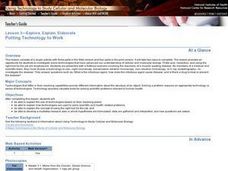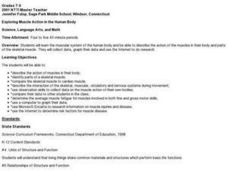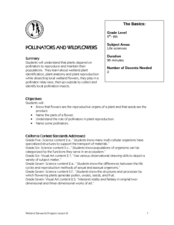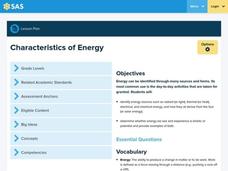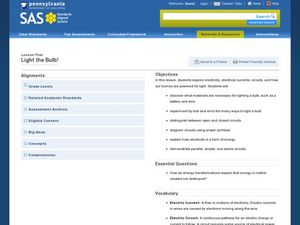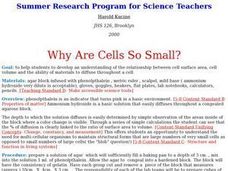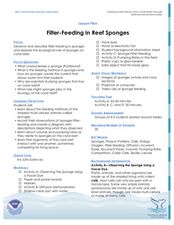K12 Reader
Tissues, Organs and Systems
Young scientists are introduced to the connections among cells, tissues, organs, and systems in a life science reading comprehension worksheet that asks them to respond to a series of questions based on the passage.
Curated OER
Genetically Modified Organisms
High Schoolers complete a variety of activities as they examine the ethics of (and take a position concerning) genetically modified organisms in the field of agriculture. They complete a PowerPoint demonstration to go along with the unit.
Curated OER
Life in a Drop of Water
Students observe the wealth of living organisms in a drop of water from our freshwater ecosystems. They classify the types of organisms observed as single-celled or multi-cellular and use a key or chart to identify and name the organisms...
Curated OER
Ego Trip- Exploring the Inner Workings of the Human Body
Students gain an understanding of how systems and organs in the human body work. They create their own fictional account of a trip through the human body, and describe one response the body makes to stimuli.
K12 Reader
What’s in Your Cells?
Organelles, cellular respiration, ATP, and DNA. The passage attached to this life science reading comprehension worksheet is all about cells. After reading about diffusion and osmosis, kids answer a series of questions based on the text.
Curated OER
Technology-Lesson 3-Putting Technology to Work
Students explain the use of different technologies based on their resolving power. Explain how technologies are used to solve scientific and health-related problems. Explain the concept of using right tool for the job and develop a multi...
Curated OER
Introductory Bacteria and Virus Worksheet
Compare and contrast eukaryotes, prokaryotes, and viruses with a chart and a Venn diagram. Beginning microbiologists consider motility, reproductive ability, DNA content, and the presence of organelles. They write short answers to...
Curated OER
Why Is My Bread Fuzzy?
Learners explore the organisms that live on counters or surfaces in the classroom. In this mold experiment, students observe mold in different conditons. Learners record their observations on a worksheet. Students understand how...
Curated OER
Teaching about the Effect of Photosynthesis and
Young scholars demonstrate the effects of photosynthesis and respiration. They decide which variables to analyze in a microcosm study. They produce a written paper, oral presentation, poster, or multi-media presentation
Curated OER
GMOs: Should We Grow Them?
Learners examine the ethics of biotechnology and genetically modifying various organisms. They complete various activities and labs on GMOs and then write a position paper regarding their individual opinions on the subject.
Curated OER
The Structure and Function of Cells: Making Biology Fun
Investigate life below a microscope, and cells and discover the differences between plant and animal cells.
Curated OER
Exploring Muscle Action in the Human Body
Students collect and graph data and use the internet to research the skeletal muscles.
Curated OER
Plankton in the Air
Here is a lab activity adequate for use with any full lesson on environmental factors that shape animal adaptations or marine animal characteristics. Pupils will discuss the role plankton plays in the environment and filter-feeding...
Pennsylvania Department of Education
Animal Classes and Their Ecosystems
Students explore animal characteristics by participating in an environment identification activity. In this animal habitat lesson, students discuss a range of different wild life and the ecosystems that they are a part of. Students view...
Curated OER
Pollinators and Wildflowers
Learners explore how plants depend on pollinators to reproduce. In this pollination lesson plan students dissect a local flower and collect and identify pollinating insects.
Curated OER
Characteristics of Energy
Fourth graders view a video and create a KWL to identify energy sources. In this energy sources lesson, 4th graders explore the meaning of energy, kinetic energy, potential energy, thermal energy, radiant energy, and electrical energy....
Pennsylvania Department of Education
Light the Bulb!
Third graders investigate electrical circuits and how light bulbs are powered. In this electricity and power lesson, 3rd graders study the vocabulary necessary which includes the different types of circuits, electrical currents, and...
Curated OER
Tic Tac Know Kingdoms
In this PowerPoint, students participate in a variation of tic tac toe in which questions about the animal and plant kingdom are presented and students move to various locations on the game board.
Curated OER
Light the Bulb
Students explore electricity. In this power experiment activity, students determine what is required for lighting a bulb. Students develop an understanding of open and closed circuits, and how energy is formed
Curated OER
Characteristics of Energy
Learners explore Earth science by completing energy worksheets in class. In this energy forms lesson, students identify and define a list of energy vocabulary terms and a K-W-L chart. Learners view a matter video clip in class and...
Pennsylvania Department of Education
Energy in Motion
Fifth graders explore energy transfer. In this thermal energy lesson, 5th graders stretch rubber bands several times and estimate the band's temperature change. Students identify this action as an example of thermal energy. Students...
Curated OER
Why Are Cells So Small?
Students examine the relationship between cell surface area and the ability of materials to diffuse through a cell. They participate in an experiment in which they determine which materials diffuse easier than others. They complete...
Curated OER
Filter Feeding in Reef Sponges
Students investigate the role of sponges in our oceans. In this biology lesson, students create a diagram visualizing how sponges bring food into their bodies through a filtering process. Students discuss the connections...
Curated OER
Filter-Feeding in Reef Sponges
Students make observations and describe the filter-feeding in sponges as it relates to the ecological role of sponges on coral reefs. In this filter-feeding in reef sponges lesson, students are introduced to the feeding methods of...







